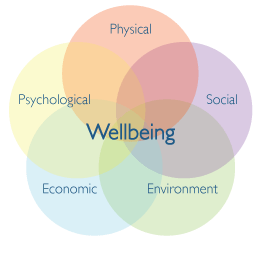 I didn?t realize that it took two and a half months since I last wrote something on the blog. It was an active time for me, during which I was a. o. expanding my knowledge and learning new skills. I will try to share with you what I learned.
Today I would like to raise the subject of well-being and its relationship with work. As research shows, living a good and happy life is very important for many people, especially young*. Owing to it, managers should be interested what to do, so that work in their teams contribute to such feeling.
One of the psychologist who explored the subject was Ed Diener. More specifically, he dealt with subjective well-being (SWB) – cognitive and affective evaluations of one?s life**. SWB consists of life satisfaction, satisfaction with important domains (like marriage or work), high level of positive affect and low level of negative affect. It can be measured by:
? a single question (e. g. How do you feel about your life as a whole?),
? multiple-item questionnaires (e.g. Positive and Negative Affect Scale), or
? the Experience Sampling Method (ESM), which consists in answering questions about everyday life at random moments for a specified period of time.
The studies on SWB initially involved identifying who is happy (e.g. married, rich, religious); and then focused on the question when and why people are happy and what processes affect happiness. Diener described three factors that affect SWB:
? temperament and personality (e.g. extroverts adapt more easily to difficult life events than neurotics);
? goals and values (e.g. having resources in areas related to ones goals are a better predictor of happiness than having resources in other areas);
? cultural and societal factors (e.g. self-esteem is better predictor of life satisfaction in individualistic than in collectivist societies).
How managers can used this knowledge in team-management? First of all, they should get to know their people well and provide task that will be in tune with their personality traits. For example, an extrovert will be more pleased if sent to the fair in order to present the company than an introvert. Second, managers should set goals that are important for their people and provide recourses to obtain them. Third, they should take action, the effect of which would be strengthening the self-esteem of employees at work. For example, by giving them tasks that are challenging but also achievable for them.
Source:
*Suh, E., Diener, E., Oishi, S., & Triandis, H. C. (1998). The Shifting Basis of Life Satisfaction Judgements Across Cultures: Emotion versus Norms. Journal of Personality and Social Psychology, 74 (2), 482-493.
**Diener, E. (2000). Subjective Well-Being. The Science of Happiness and a Proposal for a National Index. American Psychologist, 125 (2), 34-43
Graphic credit: www.healthandwellbeinguk.com
I didn?t realize that it took two and a half months since I last wrote something on the blog. It was an active time for me, during which I was a. o. expanding my knowledge and learning new skills. I will try to share with you what I learned.
Today I would like to raise the subject of well-being and its relationship with work. As research shows, living a good and happy life is very important for many people, especially young*. Owing to it, managers should be interested what to do, so that work in their teams contribute to such feeling.
One of the psychologist who explored the subject was Ed Diener. More specifically, he dealt with subjective well-being (SWB) – cognitive and affective evaluations of one?s life**. SWB consists of life satisfaction, satisfaction with important domains (like marriage or work), high level of positive affect and low level of negative affect. It can be measured by:
? a single question (e. g. How do you feel about your life as a whole?),
? multiple-item questionnaires (e.g. Positive and Negative Affect Scale), or
? the Experience Sampling Method (ESM), which consists in answering questions about everyday life at random moments for a specified period of time.
The studies on SWB initially involved identifying who is happy (e.g. married, rich, religious); and then focused on the question when and why people are happy and what processes affect happiness. Diener described three factors that affect SWB:
? temperament and personality (e.g. extroverts adapt more easily to difficult life events than neurotics);
? goals and values (e.g. having resources in areas related to ones goals are a better predictor of happiness than having resources in other areas);
? cultural and societal factors (e.g. self-esteem is better predictor of life satisfaction in individualistic than in collectivist societies).
How managers can used this knowledge in team-management? First of all, they should get to know their people well and provide task that will be in tune with their personality traits. For example, an extrovert will be more pleased if sent to the fair in order to present the company than an introvert. Second, managers should set goals that are important for their people and provide recourses to obtain them. Third, they should take action, the effect of which would be strengthening the self-esteem of employees at work. For example, by giving them tasks that are challenging but also achievable for them.
Source:
*Suh, E., Diener, E., Oishi, S., & Triandis, H. C. (1998). The Shifting Basis of Life Satisfaction Judgements Across Cultures: Emotion versus Norms. Journal of Personality and Social Psychology, 74 (2), 482-493.
**Diener, E. (2000). Subjective Well-Being. The Science of Happiness and a Proposal for a National Index. American Psychologist, 125 (2), 34-43
Graphic credit: www.healthandwellbeinguk.com I didn?t realize that it took two and a half months since I last wrote something on the blog. It was an active time for me, during which I was a. o. expanding my knowledge and learning new skills. I will try to share with you what I learned.
Today I would like to raise the subject of well-being and its relationship with work. As research shows, living a good and happy life is very important for many people, especially young*. Owing to it, managers should be interested what to do, so that work in their teams contribute to such feeling.
One of the psychologist who explored the subject was Ed Diener. More specifically, he dealt with subjective well-being (SWB) – cognitive and affective evaluations of one?s life**. SWB consists of life satisfaction, satisfaction with important domains (like marriage or work), high level of positive affect and low level of negative affect. It can be measured by:
? a single question (e. g. How do you feel about your life as a whole?),
? multiple-item questionnaires (e.g. Positive and Negative Affect Scale), or
? the Experience Sampling Method (ESM), which consists in answering questions about everyday life at random moments for a specified period of time.
The studies on SWB initially involved identifying who is happy (e.g. married, rich, religious); and then focused on the question when and why people are happy and what processes affect happiness. Diener described three factors that affect SWB:
? temperament and personality (e.g. extroverts adapt more easily to difficult life events than neurotics);
? goals and values (e.g. having resources in areas related to ones goals are a better predictor of happiness than having resources in other areas);
? cultural and societal factors (e.g. self-esteem is better predictor of life satisfaction in individualistic than in collectivist societies).
How managers can used this knowledge in team-management? First of all, they should get to know their people well and provide task that will be in tune with their personality traits. For example, an extrovert will be more pleased if sent to the fair in order to present the company than an introvert. Second, managers should set goals that are important for their people and provide recourses to obtain them. Third, they should take action, the effect of which would be strengthening the self-esteem of employees at work. For example, by giving them tasks that are challenging but also achievable for them.
Source:
*Suh, E., Diener, E., Oishi, S., & Triandis, H. C. (1998). The Shifting Basis of Life Satisfaction Judgements Across Cultures: Emotion versus Norms. Journal of Personality and Social Psychology, 74 (2), 482-493.
**Diener, E. (2000). Subjective Well-Being. The Science of Happiness and a Proposal for a National Index. American Psychologist, 125 (2), 34-43
Graphic credit: www.healthandwellbeinguk.com
I didn?t realize that it took two and a half months since I last wrote something on the blog. It was an active time for me, during which I was a. o. expanding my knowledge and learning new skills. I will try to share with you what I learned.
Today I would like to raise the subject of well-being and its relationship with work. As research shows, living a good and happy life is very important for many people, especially young*. Owing to it, managers should be interested what to do, so that work in their teams contribute to such feeling.
One of the psychologist who explored the subject was Ed Diener. More specifically, he dealt with subjective well-being (SWB) – cognitive and affective evaluations of one?s life**. SWB consists of life satisfaction, satisfaction with important domains (like marriage or work), high level of positive affect and low level of negative affect. It can be measured by:
? a single question (e. g. How do you feel about your life as a whole?),
? multiple-item questionnaires (e.g. Positive and Negative Affect Scale), or
? the Experience Sampling Method (ESM), which consists in answering questions about everyday life at random moments for a specified period of time.
The studies on SWB initially involved identifying who is happy (e.g. married, rich, religious); and then focused on the question when and why people are happy and what processes affect happiness. Diener described three factors that affect SWB:
? temperament and personality (e.g. extroverts adapt more easily to difficult life events than neurotics);
? goals and values (e.g. having resources in areas related to ones goals are a better predictor of happiness than having resources in other areas);
? cultural and societal factors (e.g. self-esteem is better predictor of life satisfaction in individualistic than in collectivist societies).
How managers can used this knowledge in team-management? First of all, they should get to know their people well and provide task that will be in tune with their personality traits. For example, an extrovert will be more pleased if sent to the fair in order to present the company than an introvert. Second, managers should set goals that are important for their people and provide recourses to obtain them. Third, they should take action, the effect of which would be strengthening the self-esteem of employees at work. For example, by giving them tasks that are challenging but also achievable for them.
Source:
*Suh, E., Diener, E., Oishi, S., & Triandis, H. C. (1998). The Shifting Basis of Life Satisfaction Judgements Across Cultures: Emotion versus Norms. Journal of Personality and Social Psychology, 74 (2), 482-493.
**Diener, E. (2000). Subjective Well-Being. The Science of Happiness and a Proposal for a National Index. American Psychologist, 125 (2), 34-43
Graphic credit: www.healthandwellbeinguk.comCONTACT
Do you have any questions? Write to us
QPSYCHOLOGY
Barska Str. 17
30-307 Kraków
WORKSHOPS, TRAININGS and ASSESSMENT
If you have any questions regarding trainings
for organisations, developmental workshops & assessment or
cooperation opportunities please contact:
Phone: 0048 502 399 723
e-mail: info@qpsychology.pl
PSYCHOLOGICAL SUPPORT AND COACHING
If you are interested in psychological support or coaching please contact:
phone: 0048 662 363 222
e-mail: gabinet@qpsychology.

0 Comments